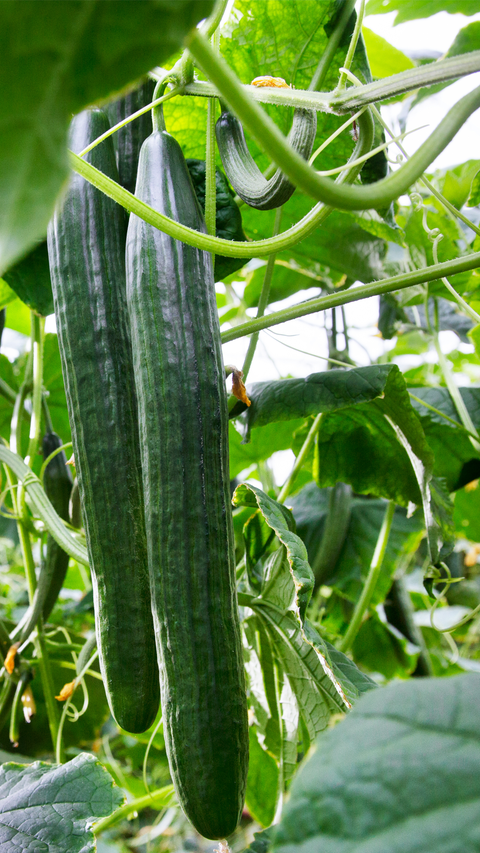News & Events
Helping Protect Supply Reliability: CGMMV-Resistant Cucumbers Reduce Supply Chain Risk

PARMA, Idaho, September 2025 – Cucumber Green Mottle Mosaic Virus (CGMMV) remains one of the most serious disease threats in commercial cucumber production. The contact-transmitted virus spreads easily via tools, hands, water, rodents, and even pests, creating the potential for rapid, devastating crop loss.
That’s why BASF's vegetable seeds business, operating in the market under the Nunhems® brand, focused its fresh cucumber breeding and technical services on helping growers minimize this risk through CGMMV-resistant varieties and integrated crop management support.
“In high-wire systems, CGMMV can derail months of investment in pruning, lowering, and crop management,” according to Robert Swinkels, high tech cucumber breeder at BASF | Nunhems. “Resistant varieties give growers a critical layer of protection against this risk.”
CGMMV infection causes stunting, fruit blemishes, and yield losses often exceeding 30% to 40% in heavily potentially infected greenhouses, says Swinkels. The economic impact can potentially reach over $100,000 per acre per season, especially in long-cycle or high-wire crops where replanting isn’t feasible, according to Swinkels.
All New Cucumber Varieties Now Come Standard with CGMMV Resistance
BASF | Nunhems began its CGMMV resistance breeding program in response to grower demand, with resistant varieties entering the market in the following years.
“Resistance is only valuable if it comes with the yield potential, fruit quality, and plant vigor growers need,” said Swinkels. The BASF | Nunhems breeding team continues to close the gap between resistant and susceptible varieties to minimize production trade-offs.
CGMMV-resistant genetics, while critical, aren’t the sole solution.
“Resistance is one tool. It must be combined with good hygiene, crop monitoring, and greenhouse management to be fully effective,” says Marcel Huibers, global agro-technologist at BASF | Nunhems.
To help, BASF | Nunhems supports growers through technical collaboration, offering guidance on:
-
Sanitation protocols: disinfecting tools, knives, and greenhouse equipment.
-
Pest and rodent control: reducing alternative vectors of spread.
-
Substrate management: advising on when to replace or sanitize slabs.
-
Early detection: water testing services that can detect CGMMV before symptoms appear in plants.
“Our job is to help growers build layered protection, including resistant varieties and good operational practices,” noted Huibers.
CGMMV-resistant cucumber varieties represent a critical tool for helping to safeguard crop investment, particularly in high-wire and long-cycle systems where yield loss from infection can be catastrophic.
These genetics significantly reduce symptom severity and viral spread, providing growers with greater crop longevity and yield potential consistency. While a slight production penalty may exist in disease-free conditions, the overall return on investment improves when factoring in the risk mitigation, lower replanting costs, and reduced operational disruptions.
When paired with best practices in sanitation, pest exclusion, and early detection, CGMMV-resistant varieties form a cornerstone of integrated disease management.
For growers aiming to protect both short-term yield potential and long-term viability, resistance is essential.
“Think of CGMMV resistance as crop insurance built into the seed,” Swinkels said. “It’s indispensable security for modern cucumber production.”
About BASF’s Agricultural Solutions division
Everything we do, we do for the love of farming. Farming is fundamental to provide enough healthy and affordable food for a rapidly growing population, while reducing environmental impacts. That’s why we are working with partners and experts to integrate sustainability criteria into all business decisions. With €919 million in 2024, we invest in a strong R&D pipeline, combining innovative thinking with practical action in the field. Our solutions are purpose-designed for different crop systems. Connecting seeds and traits, crop protection products, digital tools and sustainability approaches, to help deliver the best possible outcomes for farmers, growers and our other stakeholders along the value chain. With teams in the lab, field, office and in production, we do everything in our power to build a sustainable future for agriculture. In 2024, our division generated sales of €9.8 billion. For more information, please visit www.agriculture.basf.com or our social media channels.
About BASF
At BASF, we create chemistry for a sustainable future. Our ambition: We want to be the preferred chemical company to enable our customers’ green transformation. We combine economic success with environmental protection and social responsibility. Around 112,000 employees in the BASF Group contribute to the success of our customers in nearly all sectors and almost every country in the world. Our portfolio comprises, as core businesses, the segments Chemicals, Materials, Industrial Solutions, and Nutrition & Care; our standalone businesses are bundled in the segments Surface Technologies and Agricultural Solutions. BASF generated sales of €65.3 billion in 2024. BASF shares are traded on the stock exchange in Frankfurt (BAS) and as American Depositary Receipts (BASFY) in the United States. Further information at www.basf.com.
Information provided is based on experience with tests, trials, or practices as well as general observations over multiple years.
Individual results may vary. Nunhems USA, Inc. (“Nunhems”) strives to provide accurate and complete information, descriptions, content, illustrations, images, and data (“Information”) on its websites, social media sites/posts, and printed materials (“Publications”) as such Information is reasonably available to Nunhems at time of compilation. When the Information is based on experiences with tests, trials, or practices, such Information is provided by Nunhems as closely as commercially possible to such experiences. Information may also be based on general observations. However, Nunhems cannot guarantee the Information in any form whatsoever; therefore, the Information is provided on an ‘AS IS’ basis and without any guarantee, either express or implied, including, without limitation, that the Information is accurate or complete. Under no circumstances is the Information to be considered as advice or as a recommendation. Buyer is solely responsible for seed selection and purchasing decisions, including whether to rely upon the Information and for determining suitability of the seed for the intended growth and use under buyer’s local conditions.
The Publications are intended to help buyer identify plant diseases that may or could affect his/her crops. The images may give a distorted image of reality andmay otherwise not be an accurate portrayal of the disease

